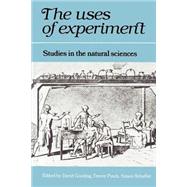
Note: Supplemental materials are not guaranteed with Rental or Used book purchases.
Purchase Benefits
What is included with this book?
| Contributors | |
| Preface | |
| Introduction | |
| Part I. Instruments in Experiments: 1. Scientific instruments: models of brass and aids to discovery | |
| 2. Glass works: Newton's prisms and the uses of experiment | |
| 3. A viol of water or a wedge of glass | |
| Part II. Experiment and Argument: 4. Galileo's experimental discourse | |
| 5. Fresnel, Poisson and the white spot: the role of successful predictions in the acceptance of scientific theories | |
| 6. The rhetoric of experiment | |
| Part III. Representing and Realising: 7. 'Magnetic curves' and the magnetic field: experimentation and representation in the history of a theory | |
| 8. Artificial clouds, real particles | |
| 9. Living in the material world | |
| 10. Justification and experimentation | |
| Part IV. The Constituency of Experiment: 11. Extraordinary experiment: electricity and the creation of life in Victorian England | |
| 12. Why did Britain join CERN? | |
| Part V. Hallmarks of Experiment: 13. From Kwajalein to Armageddon? Testing and the social construction of missile accuracy | |
| 14. The epistemology of experiment | |
| Select bibliography | |
| Name index | |
| Subject index. |
The New copy of this book will include any supplemental materials advertised. Please check the title of the book to determine if it should include any access cards, study guides, lab manuals, CDs, etc.
The Used, Rental and eBook copies of this book are not guaranteed to include any supplemental materials. Typically, only the book itself is included. This is true even if the title states it includes any access cards, study guides, lab manuals, CDs, etc.